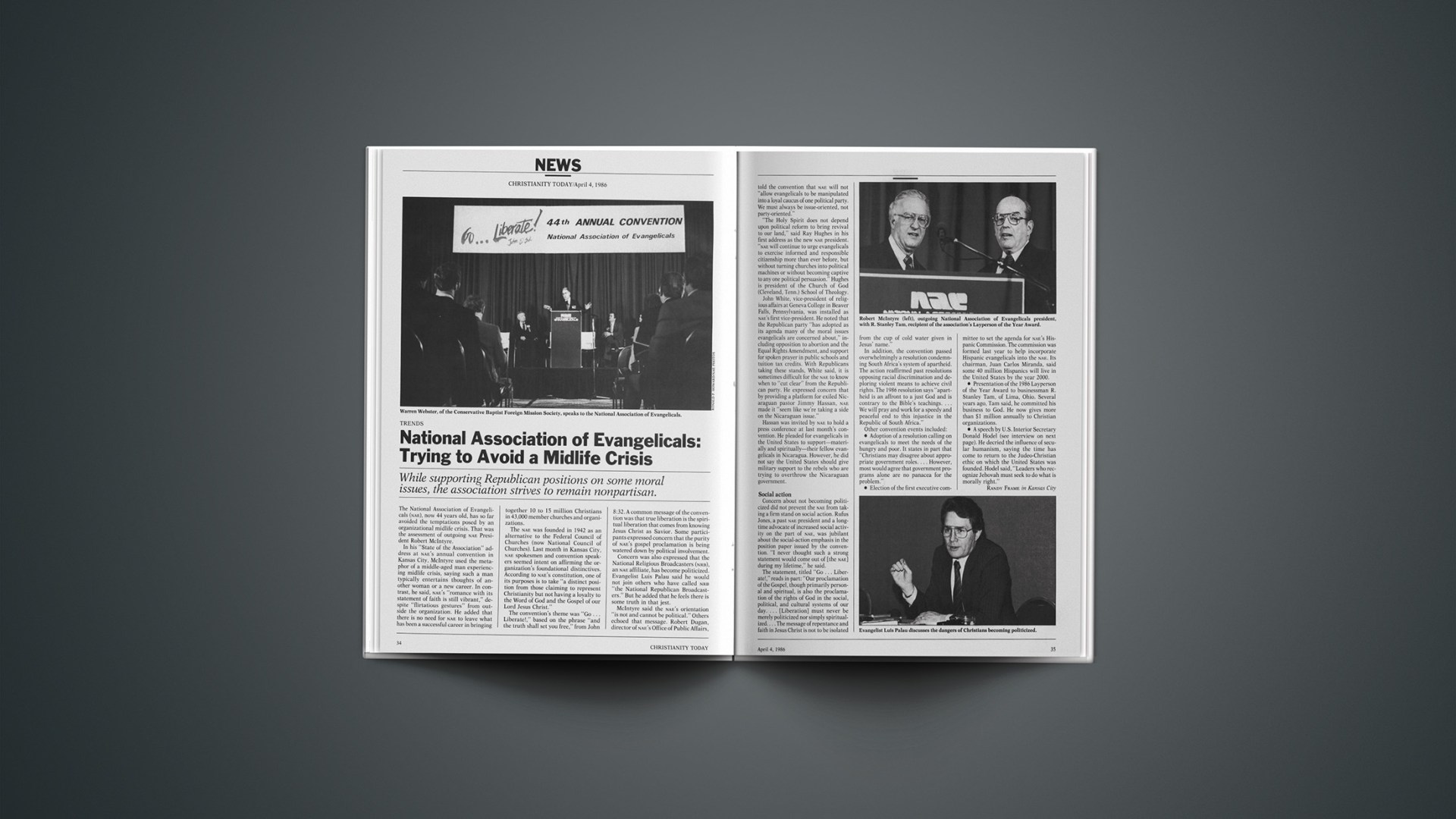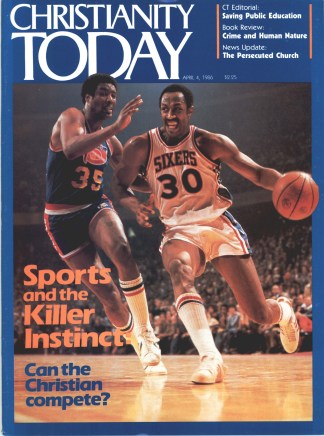While supporting Republican positions on some moral issues, the association strives to remain nonpartisan.
The National Association of Evangelicals (NAE), now 44 years old, has so far avoided the temptations posed by an organizational midlife crisis. That was the assessment of outgoing NAE President Robert McIntyre.
In his “State of the Association” address at NAE’s annual convention in Kansas City, McIntyre used the metaphor of a middle-aged man experiencing midlife crisis, saying such a man typically entertains thoughts of another woman or a new career. In contrast, he said, NAE’s “romance with its statement of faith is still vibrant,” despite “flirtatious gestures” from outside the organization. He added that there is no need for NAE to leave what has been a successful career in bringing together 10 to 15 million Christians in 43,000 member churches and organizations.
The NAE was founded in 1942 as an alternative to the Federal Council of Churches (now National Council of Churches). Last month in Kansas City, NAE spokesmen and convention speakers seemed intent on affirming the organization’s foundational distinctives. According to NAE’s constitution, one of its purposes is to take “a distinct position from those claiming to represent Christianity but not having a loyalty to the Word of God and the Gospel of our Lord Jesus Christ.”
The convention’s theme was “Go … Liberate!,” based on the phrase “and the truth shall set you free,” from John 8:32. A common message of the convention was that true liberation is the spiritual liberation that comes from knowing Jesus Christ as Savior. Some participants expressed concern that the purity of NAE’s gospel proclamation is being watered down by political involvement.
Concern was also expressed that the National Religious Broadcasters (NRB), an NAE affiliate, has become politicized. Evangelist Luis Palau said he would not join others who have called NRB “the National Republican Broadcasters.” But he added that he feels there is some truth in that jest.
McIntyre said the NAE’s orientation “is not and cannot be political.” Others echoed that message. Robert Dugan, director of NAE’s Office of Public Affairs, told the convention that NAE will not “allow evangelicals to be manipulated into a loyal caucus of one political party. We must always be issue-oriented, not party-oriented.”
“The Holy Spirit does not depend upon political reform to bring revival to our land,” said Ray Hughes in his first address as the new NAE president. “NAE will continue to urge evangelicals to exercise informed and responsible citizenship more than ever before, but without turning churches into political machines or without becoming captive to any one political persuasion.” Hughes is president of the Church of God (Cleveland, Tenn.) School of Theology.
John White, vice-president of religious affairs at Geneva College in Beaver Falls, Pennsylvania, was installed as NAE’s first vice-president. He noted that the Republican party “has adopted as its agenda many of the moral issues evangelicals are concerned about,” including opposition to abortion and the Equal Rights Amendment, and support for spoken prayer in public schools and tuition tax credits. With Republicans taking these stands, White said, it is sometimes difficult for the NAE to know when to “cut clear” from the Republican party. He expressed concern that by providing a platform for exiled Nicaraguan pastor Jimmy Hassan, NAE made it “seem like we’re taking a side on the Nicaraguan issue.”
Hassan was invited by NAE to hold a press conference at last month’s convention. He pleaded for evangelicals in the United States to support—materially and spiritually—their fellow evangelicals in Nicaragua. However, he did not say the United States should give military support to the rebels who are trying to overthrow the Nicaraguan government.
Social Action
Concern about not becoming politicized did not prevent the NAE from taking a firm stand on social action. Rufus Jones, a past NAE president and a long-time advocate of increased social activity on the part of NAE, was jubilant about the social-action emphasis in the position paper issued by the convention. “I never thought such a strong statement would come out of [the NAE] during my lifetime,” he said.
The statement, titled “Go … Liberate!,” reads in part: “Our proclamation of the Gospel, though primarily personal and spiritual, is also the proclamation of the rights of God in the social, political, and cultural systems of our day.… [Liberation] must never be merely politicized nor simply spiritualized.… The message of repentance and faith in Jesus Christ is not to be isolated from the cup of cold water given in Jesus’ name.”
In addition, the convention passed overwhelmingly a resolution condemning South Africa’s system of apartheid. The action reaffirmed past resolutions opposing racial discrimination and deploring violent means to achieve civil rights. The 1986 resolution says “apartheid is an affront to a just God and is contrary to the Bible’s teachings.… We will pray and work for a speedy and peaceful end to this injustice in the Republic of South Africa.”
Other convention events included:
• Adoption of a resolution calling on evangelicals to meet the needs of the hungry and poor. It states in part that “Christians may disagree about appropriate government roles.… However, most would agree that government programs alone are no panacea for the problem.”
• Election of the first executive committee to set the agenda for NAE’s Hispanic Commission. The commission was formed last year to help incorporate Hispanic evangelicals into the NAE. Its chairman, Juan Carlos Miranda, said some 40 million Hispanics will live in the United States by the year 2000.
• Presentation of the 1986 Layperson of the Year Award to businessman R. Stanley Tam, of Lima, Ohio. Several years ago, Tam said, he committed his business to God. He now gives more than $1 million annually to Christian organizations.
• A speech by U S. Interior Secretary Donald Hodel (see interview on next page). He decried the influence of secular humanism, saying the time has come to return to the Judeo-Christian ethic on which the United States was founded. Hodel said, “Leaders who recognize Jehovah must seek to do what is morally right.”
RANDY FRAMEin Kansas City










